At its July 2023 meeting, the TPB approved Maryland Transportation Alternatives Set-Aside projects, a Virginia TIP amendment, and the September 22 Car Free Day Proclamation. Additional agenda items included an overview of the draft National Capital Region Freight Plan and COG’s upcoming Enhanced Mobility grant application period. The meeting wrapped with a report on the TPB’s March 2023 federal certification review.
Meeting agenda, materials, and recording
Recognition of Gary Erenrich’s Retirement
TPB Chair Reuben Collins recognized Gary Erenrich, Montgomery County Department of Transportation Special Assistant to the Director and Alternate Committee Member, on his upcoming retirement. Erenrich served on the TPB for over 20 years on behalf of Montgomery County, Montgomery County Executive, and Montgomery County DOT and received a certificate of appreciation. The TPB thanks Gary for his distinguished service to the region!
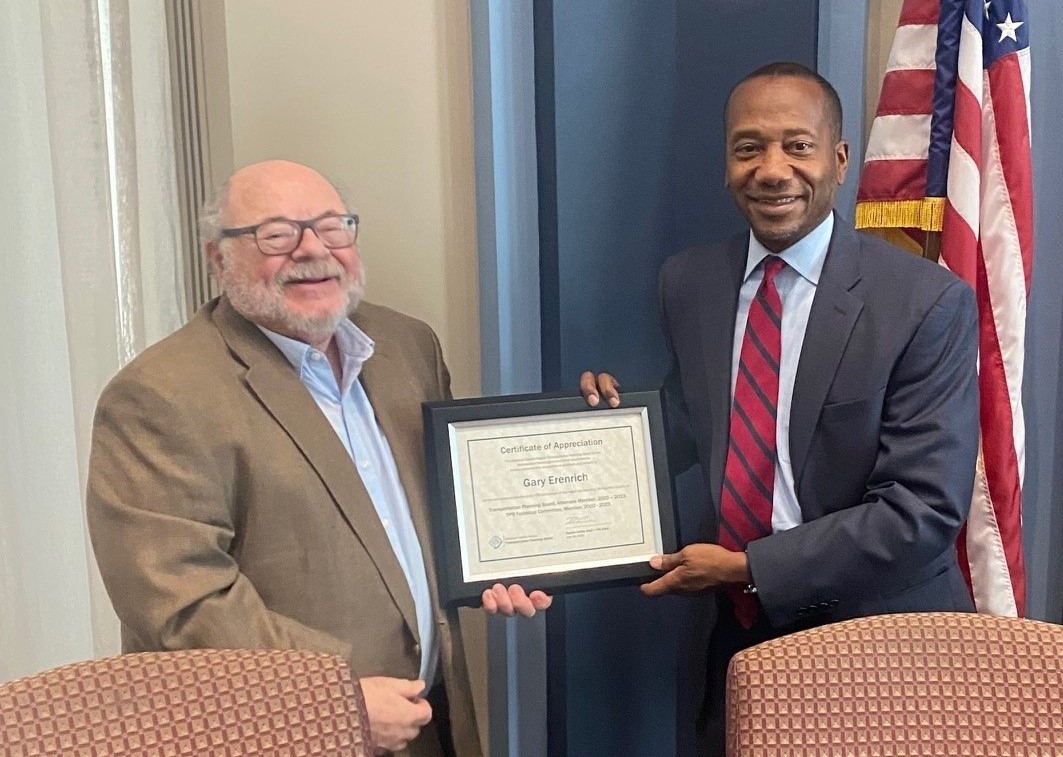
TPB Chair Reuben Collins and Gary Erenrich (COG/TPB)
ACTION ITEMS
Car Free Day Proclamation
Nicholas Ramfos, TPB Transportation Operations Program Director, provided an overview of Car Free Day on September 22--an international event which coincides with European Mobility Week. The metropolitan Washington region became active in promoting Car Free Day in 2008 to encourage use of sustainable transportation measures, such as transit, cycling, walking, scootering, telework, and carpooling. For Car Free Day 2023, the pledge goal is 5,000 individuals. During the most recent Car Free Day survey in 2022, 59 percent of respondents who changed their commute mode on the event day said that they would have most likely driven alone that day. Thirty-one percent of respondents increased used of car-free and car-lite options during the event. On average, the use of these alternative options remained the same after the event.
The TPB unanimously approved the Car Free Day 2023 Proclamation. Find out more by visiting carfreemetrodc.org/.
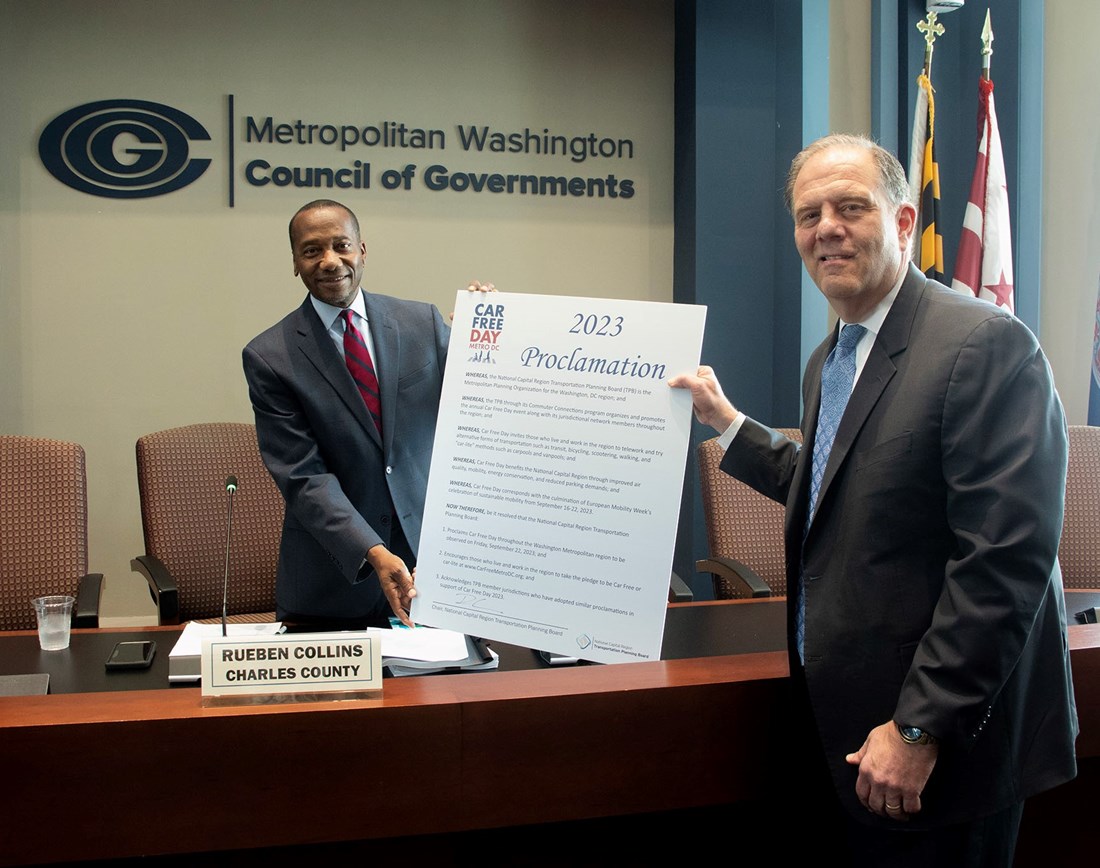
TPB Chair Reuben Collins and TPB Program Director Nicholas Ramfos (COG)
FY 2024 Maryland Transportation Alternatives Set Aside (TA Set-Aside) Program Projects
Following a presentation by TPB Transportation Planner John Swanson, TPB members adopted Resolution R1-2024, approving FY 2024 funding at a total of over $3.2 million for six Suburban Maryland projects to support cycling, walking, trail connections, and Complete Streets access. Projects are listed below, and more information is available in the TA Set-Aside news release. Any funds not approved by the TPB are returned to Maryland Department of Transportation and added to a Maryland statewide funding opportunity for Transportation Alternatives projects.
Julia Koster, Director of Public Engagement for the National Capital Planning Commission, commented, “The projects are exciting in how they continue to extend and connect the region’s trail network and how they bring walkable bikeable features to communities around the region.”
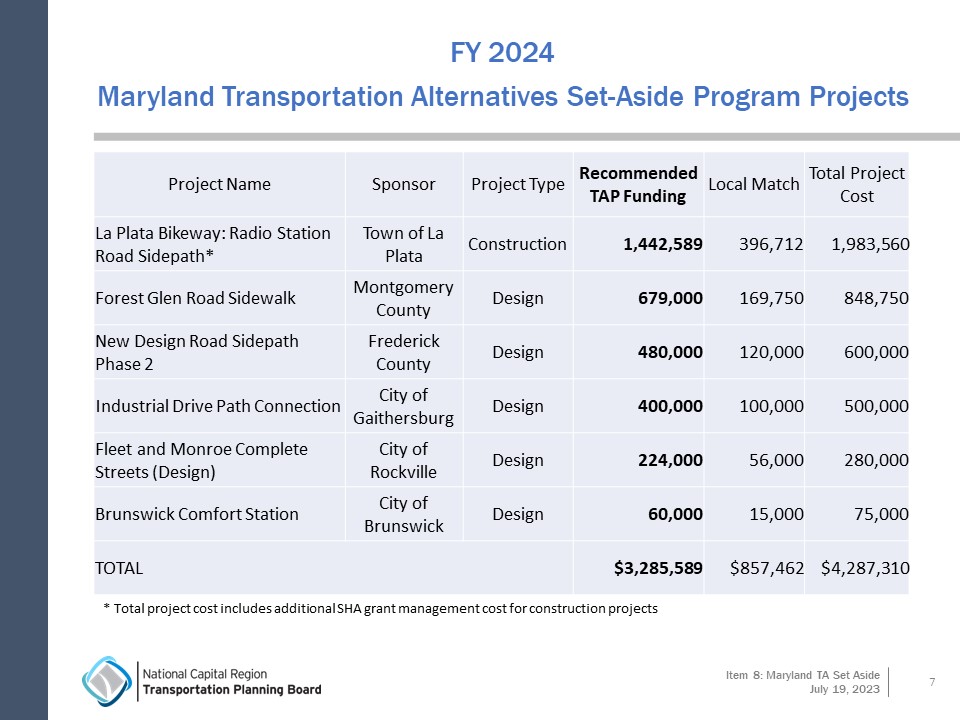
(COG/TPB)
Virginia Department of Transportation TIP Amendment
The TPB adopted Resolution R2-2024 to amend project and funding information for Virginia projects in the FY 2023 – 2026 Transportation Improvement Program (TIP). The amendments are required due to funding level changes, revised project records or project description, or changes to funding sources used. Complete details are available in the Item 9 memo on the July TPB meeting page.
INFORMATIONAL ITEMS
Draft National Capital Freight Plan
Andrew Meese, TPB Program Director for Systems Performance Planning, provided an overview of the draft 2023 Update of the National Capital Region Freight Plan.
The TPB prepares a freight plan as part of the MPO’s federal requirement to consider freight among factors in the metropolitan planning process. The plan is one element of the TPB’s freight planning and analysis toolbox in that freight planning is ongoing through the TPB’s Unified Planning Work Program, the TPB freight subcommittee, periodic freight forums, and freight input into the Visualize long-range planning process.
Trends in the Region
The region’s freight movements incorporate commercial trucking, rail, pipelines, and air cargo. Trucking making up over 70 percent of regional freight by value and weight. The region as a whole is experiencing growth in truck freight movement as well as growth in the multiple modes and mail category, which ties to the increase in mail order retail and package delivery. Home delivery grew during the pandemic, and the long-range trends of home delivery and e-commerce has affected warehouse location and truck deployment. Related to this, air cargo shipments are shrinking at the national level because of lower costs of shipping perishables by ground than by air. Meese noted that one surprising trend for the region is the decline in fatalities that are truck related despite increases in fatalities overall.
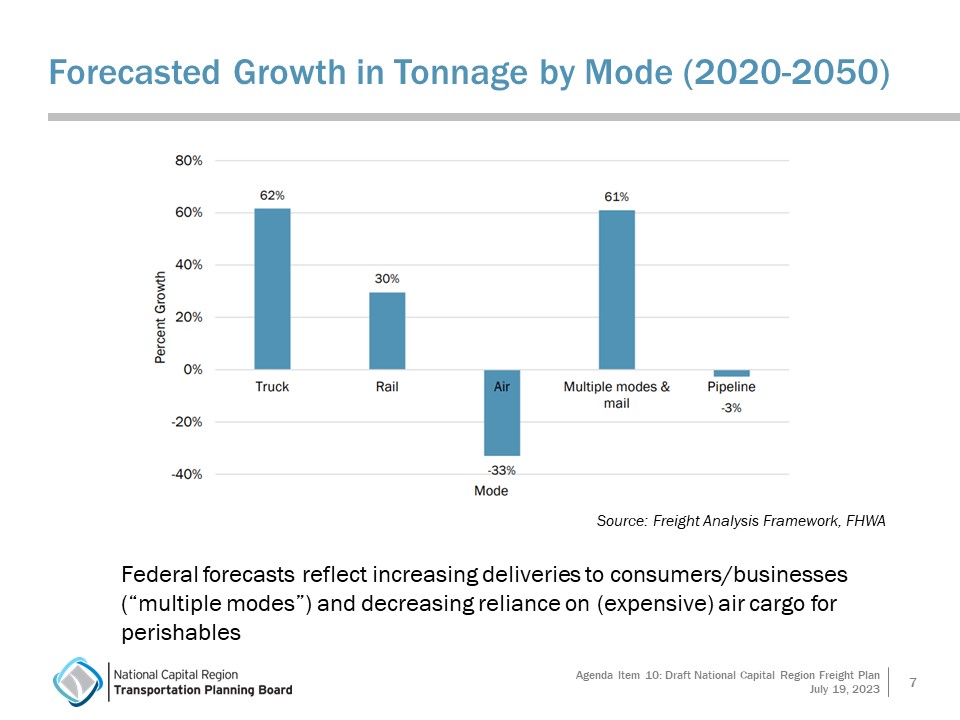
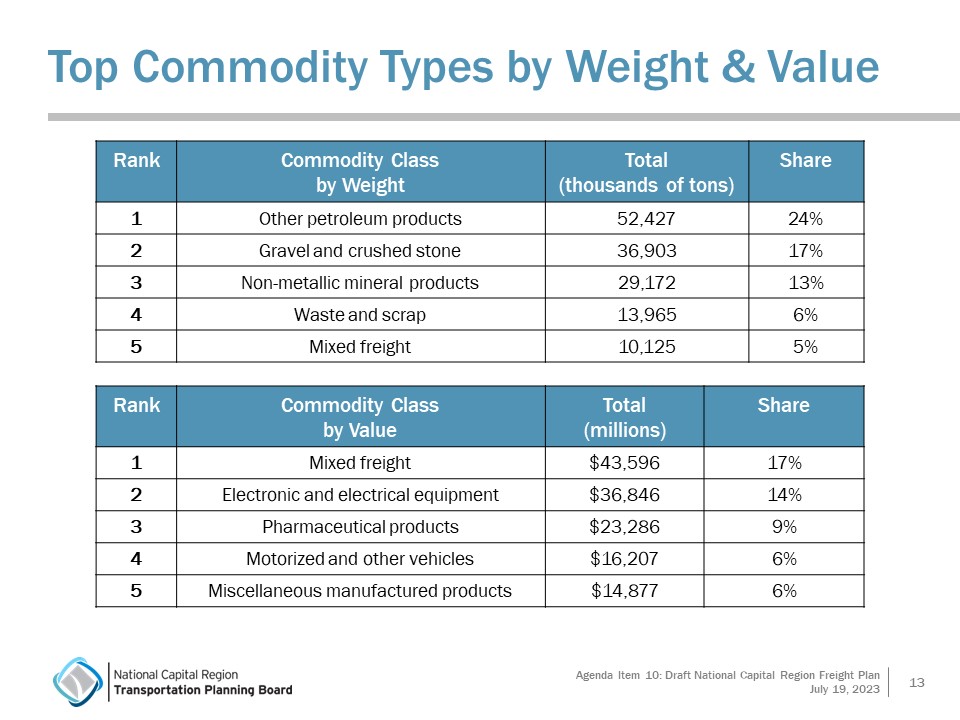
(COG/TPB)
Issues and challenges surrounding freight include examining how newer technologies such as electric vehicles and drones may affect delivery mechanisms, and congestion remains an ongoing concern. The plan addresses the region’s freight policies which reflect the TPB’s overarching policies of sustainability, equity benefit and avoidance of disproportionate impacts, support for environmental and resilience objectives, economic safety, maintaining a state of good repair, and congestion relief.
Freight Plan Recommendations
Recommendations of the 2023 plan:
- Continue support of the TPB Freight Subcommittee and hosting periodic forums including private sector participation
- Continue freight data collection and analysis
- Bolster and facilitate relationships with TPB member jurisdictions, stakeholders, and federal/state partners to discuss issues and trend.
- Continuous Airport System Planning (CASP)
Strategies for strengthening freight planning:
- Continue to monitor safety, equity, and environmental considerations, including impacts of freight movement on Equity Emphasis Areas
- Monitor key economic and industry trends impacting goods movement
- Monitor technological developments in freight movement, such as autonomous and connected freight vehicles and unmanned aerial systems (drones).
- Follow up with the TPB on Infrastructure Investment and Jobs Act (IIJA) freight-related programs
- Provide information to the TPB and freight stakeholders on the status or progress on this Plan’s identified freight policies when such information becomes available.
Meese stated that the TPB has encouraged national action on emission standards for trucks and decarbonization, and COG supports land use planning and economic development activities of which freight movement is considered a critical element of the region’s overall economic vitality.
David Snyder, City of Falls Church Councilmember, asked whether the TPB will make freight-related recommendations around the reduction of greenhouse gases and safety. In addition, Snyder also inquired whether the freight plan considers Virginia’s plans to improve rail connectivity, including the Long Bridge project, which will support freight rail as well as passenger rail. Meese reported that the Freight Plan takes these factors into consideration. For example, Section 5 of the plan discusses rail congestion and safety, and freight issues, challenges, and opportunities around reducing emissions.
TPB Staff Director Kanti Srikanth commented that reducing truck emissions is part of implementing the TPB’s adoption of climate mitigation strategies to achieve on-road greenhouse reduction targets. Srikanth mentioned that the TPB has provided public comments to the U.S. Environmental Protection Agency supporting EPA’s proposed rules for light, medium, and heavy duty vehicle emissions standards. The TPB considers both rules to be helpful for attaining and maintaining 2015 ozone standards and attaining greenhouse gas reduction goals. The letter is available in the June 2023 TPB Director’s Report (Item 5).
Arlington County Board Member Takis Karantonis asked whether the plan considered working conditions of drivers and individuals who work in the transportation networks. In addition, he inquired whether the study is going to make recommendations with regards to best practices for residential delivery. Karantonis said that the Arlington County Board has received comments from residents about residential streets receiving multiple visits for local deliveries, which is inefficient. Karantonis encouraged the TPB to look at workforce conditions in relation to logistical systems of freight movement because of how this impacts cost factors and efficiencies, particularly as demand for deliveries has increased and the supply of workers has decreased.
Meese noted the Freight Plan includes references to workforce development strategies in Section 5. The TPB does recommend supporting and implementing best practices, but the plan itself does not go into detail about specific best practices.
Enhanced Mobility Grant Solicitation
Mohammad Khan, COG Enhanced Mobility Program Manager, briefed the TPB on COG’s upcoming Enhanced Mobility grant program solicitation. Beginning on August 1 through September 30, organizations in the region may apply for Federal Transit Administration (FTA) Section 5310 funding to support mobility services for older adults, individuals with low incomes, and individuals with disabilities. Approximately $10.8 million will be available in funding for operating (available with a 50-percent match) or capital projects (available with a 20-percent match).
Eligible applicants for the program are non-profit organizations, local governments, transit agencies, and private for-profit providers that benefit travelers in the urbanized area mapped below. Agencies in areas outside the urbanized area may apply for Enhanced Mobility funds through Maryland DOT or Virginia DOT.
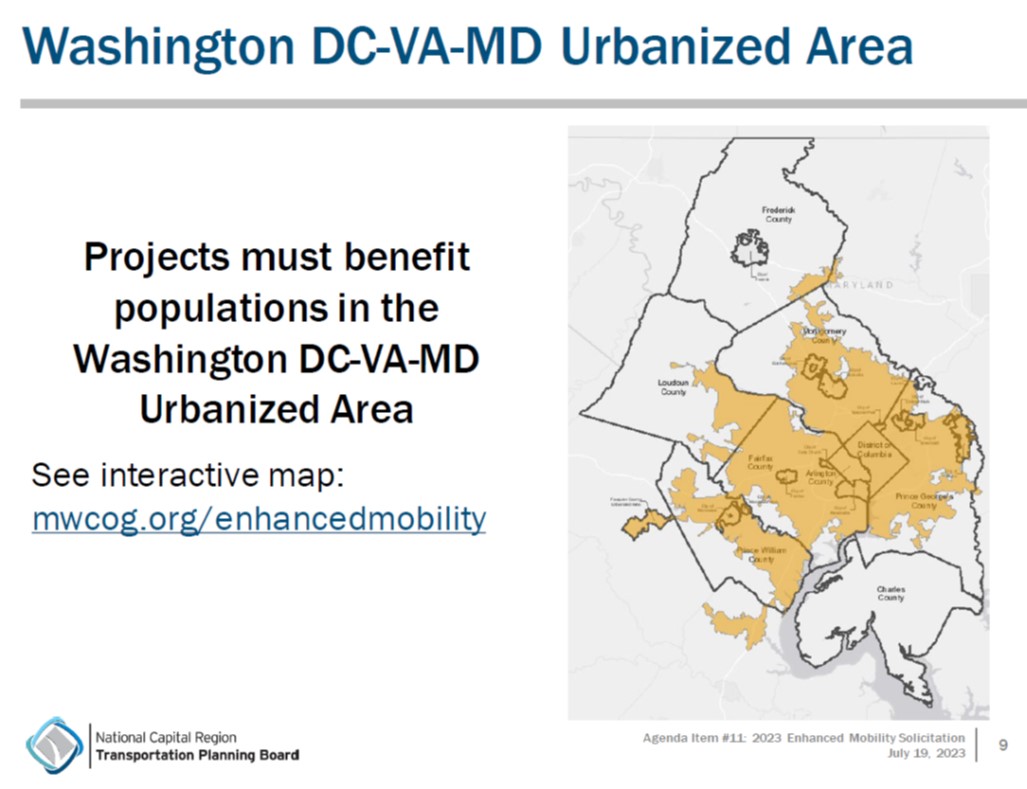
(COG/TPB)
The general schedule for project selection and approval is:
August – September 2023: Application period
October – November 2023: Selection committee review
December 2023 TPB meeting: Request for project approval
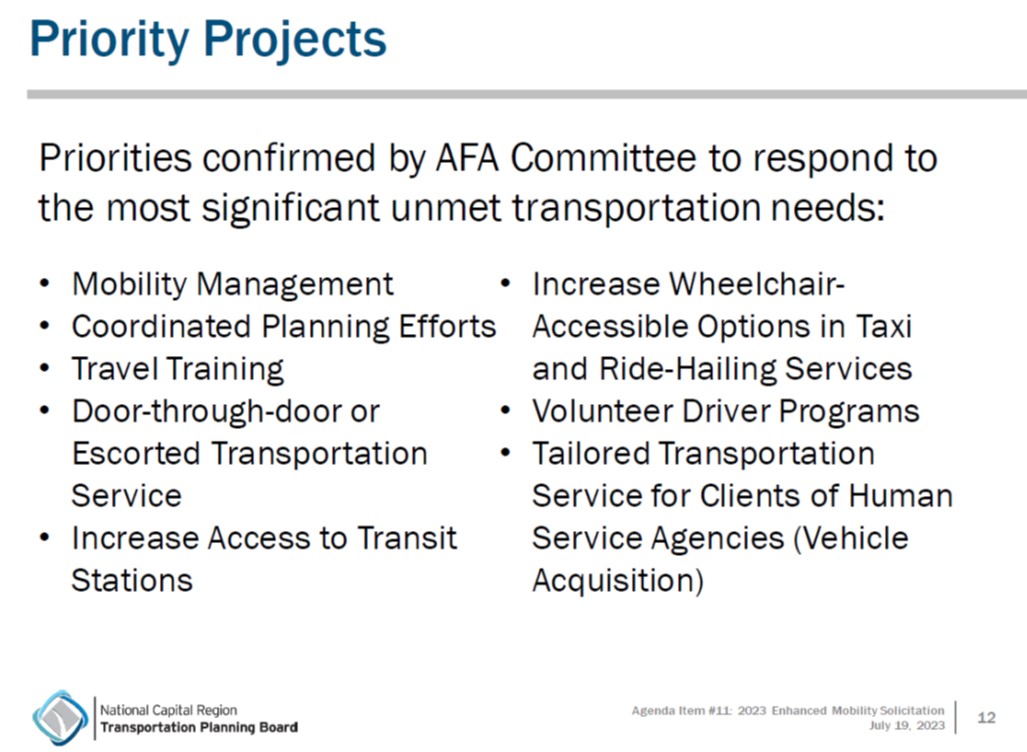
(COG/TPB)
Gary Erenrich asked about Enhanced Mobility Program outreach that will be conducted to agencies in COG’s Equity Emphasis Areas (EEAs).
Khan commented that the Enhanced Mobility team is reaching out to community leaders and Commuter Connections contacts to help spread the word. Srikanth said that in addition to reaching prior applicants, the TPB has a list of more than 100 organizations on an outreach list and the TPB committees and subcommittees are supporting outreach about the grant opportunity.
Erenrich followed up by asking what would be helpful for smaller agencies or new applicants with the application process. Khan said that staff at smaller agencies may reach out directly to TPB staff on the Enhanced Mobility team to address application questions. In addition, the pre-application conferences are mandatory and useful. The conferences are held to ensure that applicants have all the documentation before they're able to apply and to know which documentation is necessary.
Transportation Planning Certification Review
In March 2023, the TPB participated in a transportation planning certification review led by U.S. DOT staff. The review takes place every four years and is conducted by Federal Highway Administration (FHWA) and FTA staff to certify that planning requirements of the MPO are being satisfactorily implemented. In the metropolitan Washington region, the planning area includes north Stafford County, which means that the Fredericksburg Area MPO also participates in the certification review. Reviews consist of site visits, a public participation element conducted through the TPB’s Community Advisory Committee, and a desk review of TPB documents, plans, and website.
Laura Keeley, Federal Transit Administration Director of the Office of Planning and Program Development, presented an overview of the TPB’s certification, which includes seven commendations and a few recommendations for building on the next transportation plan update, such as reexamining financial assumptions and revenue estimates for regional infrastructure costs, and development of an ADA transition plan (Item 12 on the July TPB agenda).
Commendations highlighted positive initiatives and planning practices or program management such as taking an inclusive approach in preparing Visualize 2045 by considering equity, climate change, safety, and other future factors to guide decision-making. In the area of financial planning, the TPB was commended for identifying and graphically demonstrating income expectations for maintaining and operating highways and public transportation systems in the D.C. region. Other commendations highlighted:
- Environmental Justice analysis and mapping
- Visualize 2045 Voices of the Region public input process
- Congestion Management data clearinghouse
- Performance-Based Planning and Programming for Highway Safety, Pavement and Bridge Condition, Highway System Performance, Congestion Mitigation and Air Quality Program, and Transit Asset Management
- Climate and Resilience planning including incorporating greenhouse gas emissions reduction goals into long-range planning and hiring a resilience planner
Chair’s Remarks
Chair Collins noted that the TPB is currently engaged in updating the Visualize 2045 long-range transportation plan update. The TPB anticipates adopting an updated plan in 2025. TPB member jurisdictions are due to submit their list of transportation projects that they plan to fund and implement by 2050 by the end of 2023.
Collins reported that the COG board held its annual retreat in July, and the agenda included discussion of Metro funding. COG and TPB board members in attendance were unanimous in their view that Metro is critical to the region’s transportation and socioeconomic well-being and development, and there is agreement that the region must and will work together to address the issue with WMATA in all that it's facing.
COG Executive Director Clark Mercer provided an overview of the COG Board retreat. Mercer noted that the uniform consensus from retreat participants was that Metro is “absolutely a commitment, and we have to succeed” and that economic development and an ability for the region to attract and retain businesses is linked to a “highly functioning and well-supported Metro.”
Mercer said that COG is committed to bringing together stakeholders throughout the region to address Metro concerns as well as amplifying good news coming out of Metro, including how the transit system addressed longstanding issues and deferred maintenance. In the coming weeks, COG will convene groups around 15 to 20 topics to come up with a regional plan to set Metro on a path for long-term sustainability.
Committee and Director’s Report Highlights
TPB Technical Committee, TPB Community Advisory Committee, Steering Committee, and Director’s reports are available on the July TPB meeting page.
Steering Committee and Director’s Report Highlights
Kanti Srikanth reported the following to the board members:
- On June 7, the Steering Committee approved two TIP amendments at the request of the District DOT which adds approximately $92 million in federal and local funds for the DDOT bridge program and I-395 Bridge over the Potomac River. The second approved amendment adds $1.6 million for the Maryland DOT’s improvements to an historic bridge on Governors Bridge Road that connects Prince George’s County and Anne Arundel County.
- The TPB issued two letters of support for Montgomery County grant applications related to the federal Safe Streets and Roads for All program.
- The TPB is accepting applications through August 24 from member agencies for the Transit Within Reach program. A total of $250,000 is available for the program.
- The Director’s report includes a brief on FY 2024 Unified Planning Work Program initiatives. TPB staff will undertake 11 new initiatives, above and beyond the MPO’s annual activities.
David Snyder, City of Falls Church Councilmember, asked if TPB staff could prepare a response to Northern Virginia Transportation Alliance public comments at the July TPB meeting. He noted that private enterprise in the region depends on an effective transit system, specifically Metro. Snyder stated that everyone will need to work together, especially the business community, to achieve a successful result for Metro funding. Snyder recommended a response that the TPB understands the importance of controlling costs but will need NVTA’s to help preserve and maintain the Metro system. [NVTA’s public comment is recorded on the July 19 TPB meeting livestream at the 17:54 mark.]
NEXT MEETING
The next TPB meeting is scheduled for September 20 at 12:00 P.M. A YouTube livestream option is available for all TPB board meetings.